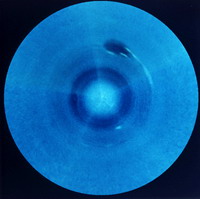Neptune's southern pole is much hotter than other parts of distant planet
The south pole of Neptune has a long hot summer.

An international team of astronomers has found that - unlike on Earth - Neptune's southern pole is much hotter than other parts of the distant planet. At least for now.
The apparent reason: a summer lasting 40 years.
Neptune is the farthest planet from the Sun, with nearly 4.5 billion kilometers (2.8 billion miles) between them. A Neptunian year - the time it takes to orbit the Sun - is equivalent to about 165 Earth years.
One result of that long rotation has been to expose Neptune's southern pole to the Sun for nearly 40 years, warming it up. Because it is so far away, Neptune gets only 1/900th of the sunlight on Earth, but that still appears to have had a significant impact.
Temperatures at Neptune's south pole are about 10 degrees Celsius (18 degrees F) higher than elsewhere. But don't unpack that bathing suit just yet: Neptune's average temperature is minus 214 degrees Celsius (-353 F), according to NASA.
An array of scientific organizations announced the findings Tuesday, including the government-funded CNRS research body in France and ESO, the European Organization for Astronomical Research in the Southern Hemisphere, whose telescope in Chile was used.
"Neptune's south pole is currently tilted toward the Sun, just like the Earth's south pole is tilted toward the Sun during summer in the Southern Hemisphere," said astronomer Glenn Orton, lead author of the findings. He was quoted in an ESO news release.
"On Neptune, the Antarctic summer lasts 40 years instead of a few months, and a lot of solar energy input during that time can make big temperature differences between the regions in continual sunlight and those with day-night variations," he said.
The heat has, in turn, defrosted methane normally trapped as ice in the planet's atmosphere, releasing it as gas, the CNRS said. It said there is eight times more methane over the south pole than in the rest of the planet's atmosphere.
The abundance of gaseous methane in Neptune's stratosphere - one of the layers of its atmosphere - had gone unexplained until now, it added.
Despite its huge distance from Sun, "the atmosphere of Neptune is a scene of great activity" - perhaps more so than those of Jupiter or Saturn, even though they are closer to the Sun, the CNRS statement said.
But all long summers, it seems, come to an end.
As Neptune continues its long orbit, the north pole will in turn move into summer and be exposed to the Sun, and methane gas could shift northward, CNRS said.
Subscribe to Pravda.Ru Telegram channel, Facebook, RSS!


